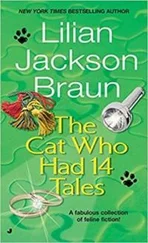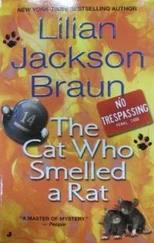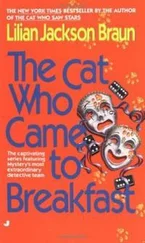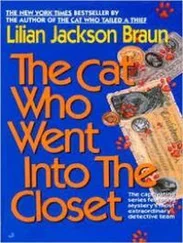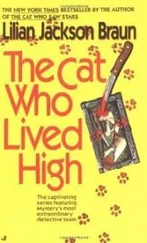Qwilleran said, “I hear that land fraud goes on all the time without the homicide—because people are ignorant or greedy.”
Koko looked up briefly from his empty plate and said, “Yow!”
“Why is he staring at me?” Simmons asked.
“Look at your watch.”
“It’s eleven o’clock.”
“He wants his bedtime snack. Would you like to feed him?”
“Me? How do I do it?”
“See that glass jar on the kitchen counter? It’s full of homemade crunchies. Just put half a cupful on one plate and a little less on the other. Then put them on the floor under the kitchen table. Koko’s goes on the right.”
Simmons followed instructions, at the same time saying, “Look, Ma! I’m feeding a cat.”
For the Sunday matinee there was another full house at the Hotel Booze, and a greater air of excitement prevailed; show-goers had heard from friends and relatives how the imaginary broadcast was a retelling of family history. During the performance an occasional whimpering in the audience came, perhaps from the granddaughter of the farmer who had been buried under an avalanche of snow in his own barn, or a descendant of a lifesaving crewman who had participated in a heroic rescue. When it was over, the listeners swarmed to the platform with compliments and handshakes.
One of them was Thornton Haggis, who had been given credit in the printed program for his historical research. He said, “Qwill, you slick operator! You really brought my dead notes to life!”
“Come to the barn for a celebration one day this week,” Qwilleran said.
As he was packing his gear, Gary rushed into the so-called dressing room with a cordless phone. “A call for you, Qwill. She says it’s urgent.”
Susan Exbridge was on the line, without her usual flip manner. “Qwill! Could you come to the dedication at Mount Vernon as soon as possible? Something awful has happened! I need to talk to you.”
“Where’ll I find you? Is there a large crowd?”
“Not too many. I’ll watch for you driving down the Parkway and be out in front. You can pick me up. Then we can talk in private.”
Mystified by the call, he asked Maxine to finish packing the gear, and he left the hotel by a back door.
FIFTEEN

The dedication of the Carroll Memorial Museum had not been planned as a public spectacle; it was more of a symbolic ceremony and news event. When Qwilleran arrived in answer to Susan Exbridge’s urgent call, he found cars parked on both sides of the Parkway, including photographers’ vans and the airport limousine rented by the TV crew from Down Below, but there were few persons in sight. They were indoors, as he later learned. But Susan was on the sidewalk in front of the building, ready to flag down Qwilleran’s SUV.
When he pulled up, she opened the door and jumped in. “Park over there,” she said.
“Where’s Edythe? Is she all right?”
“For publication . . . she’s all right. In the ceremony on the portico she handed over the key to the mayor and accepted an armful of roses, and a clergyman said a blessing, and now they’re indoors—with officers of the historical society—having tea, but when it’s over and I take her home . . . I’ll need your advice, Qwill.”
“You’ll have to fill me in. Wait until I park properly.”
He found a spot from which they could see the dignitaries leaving the building, and his hand went briefly into his jacket pocket as Susan began to talk.
“Well, to begin with . . . Edythe has always avoided the glare of publicity, and her husband shielded her from it. They had fifty beautiful years together—Dr. Dell and the ballerina! It was a real romance. Knowing this, I was sure she’d be nervous before the dedication, so I offered to stay with her. We had dinner last night in the residents’ dining room, and I spent the night on a rather uncomfortable daybed in the spare room where she has her weaving loom and Dr. Dell’s stationary bicycle, which she can’t bear to part with.
“This morning we were having a pleasant continental breakfast in the apartment, when the reception desk in the lobby called and said that someone claiming to be Mrs. Carroll’s granddaughter was there, and would it be all right to send her upstairs?
“Edythe gave the okay but looked worried. She said, ‘What could I do? She’s my own flesh and blood.’ Older people around here are always talking about flesh and blood as an excuse for anybody doing anything. I hate that expression. But the doorbell rang, and there stood Edythe’s flesh and blood, looking like a hobo and carrying a shabby duffel bag. Edythe gave her a grandmotherly hug that didn’t seem genuine, and asked how she got here.
“Alicia said, ‘I hitched a ride. I was tired of camping out. I want to stay here. I’ll sleep on the floor if you don’t have a bed.’ Edythe showed her to the spare room and the shower, and gave her some towels.
“After a shower and change of clothes, the young woman still looked like a hobo, and I was sure she’d attend the dedication and embarrass her grandmother.
“Alicia said, ‘No, I’ll just stay here and pedal Gramps’s bike and cry—while you’re giving away my inheritance to this dump of a town.’
“Edythe said, ‘You don’t need a six-bedroom house; you’ll have two trust funds and other property.’ I found it appalling and excused myself, saying I’d be back at two o’clock to take her to the dedication. I had customers in the building who had heirloom furniture to sell. When I returned, Edythe was dressed and ready to go—wearing her lavender silk that looks so good with her silvery gray hair and alabaster complexion. To my shocked surprise, her face looked gray and drawn. No wonder! Alicia had just concocted a horrendous lie—that Dr. Dell had abused her while she was in high school, and that’s why she left right after graduation.
“It was so untrue, Qwill, but that wicked girl knew how to hurt her grandmother. No intelligent person in Brrr would believe it, but there are always malicious gossips who enjoy spreading nasty rumors.”
He turned off the tape recorder and said doubtfully, “Is there anything at all I can do? I certainly feel bad about it.”
“Yes! Would you come home with us after the dedication? Supposedly to have a cup of tea, but really because you’re an important person, and your presence might do some good. Edythe isn’t asking this, I’m asking this.”
Qwilleran “shifted gears,” as he liked to say. He became an important person instead of a somewhat tired actor. “Let’s go indoors here and shake some hands!” Hand shaking was part of his job at the Moose County Something.
Everyone in the drawing room was well dressed, and Qwilleran was wearing rehearsal clothes, but there were no rules for important persons. Casually he let it be known that he had just come from doing a matinee of the Great Storm show. Everyone had heard that it was wonderful.
A dozen persons were standing about the drawing room, holding teacups, when he strode into the room. There were gasps! They recognized the moustache of the author of the “Qwill Pen” column.
First he clasped Edythe’s right hand in two of his, said she looked lovely, and complimented her on her magnificent gesture in donating a historic treasure to the community. No town could be more deserving!
He shook hands with the mayor, a hearty fellow with a grip like a vise, who said, “You should have made the speech—it would have been a heck of a lot better than mine!”
He shook hands with the pastor, who said, “My wife and I take turns reading your column aloud—she on Tuesday, me on Friday!”
Читать дальше


